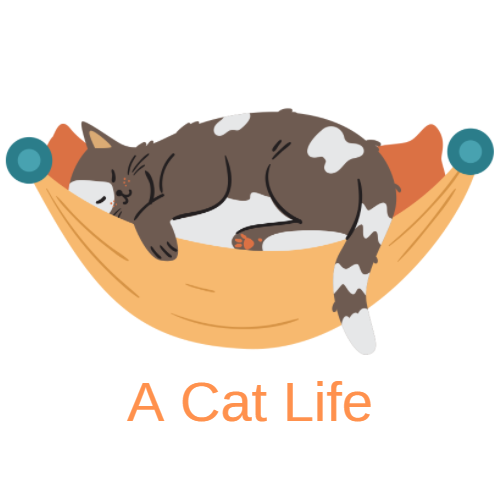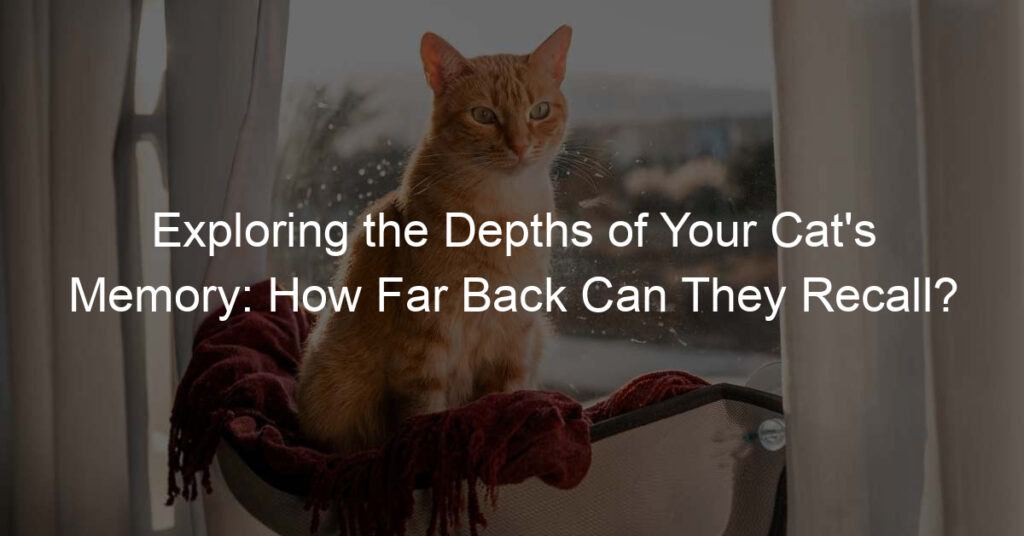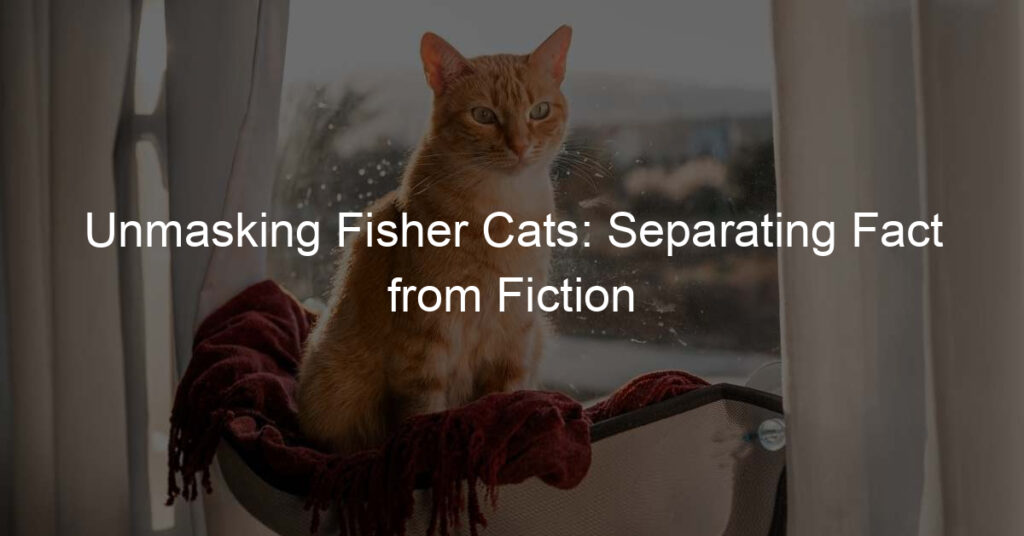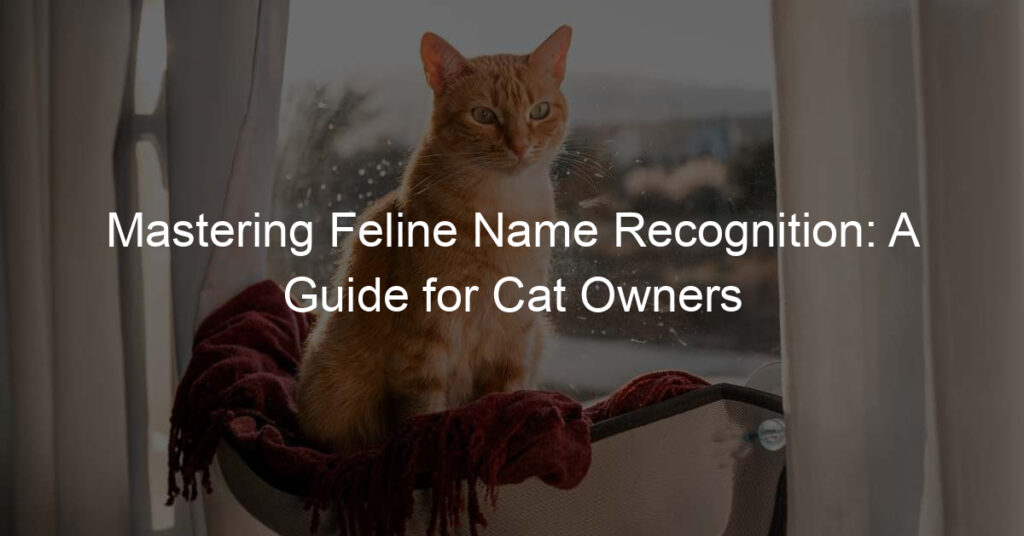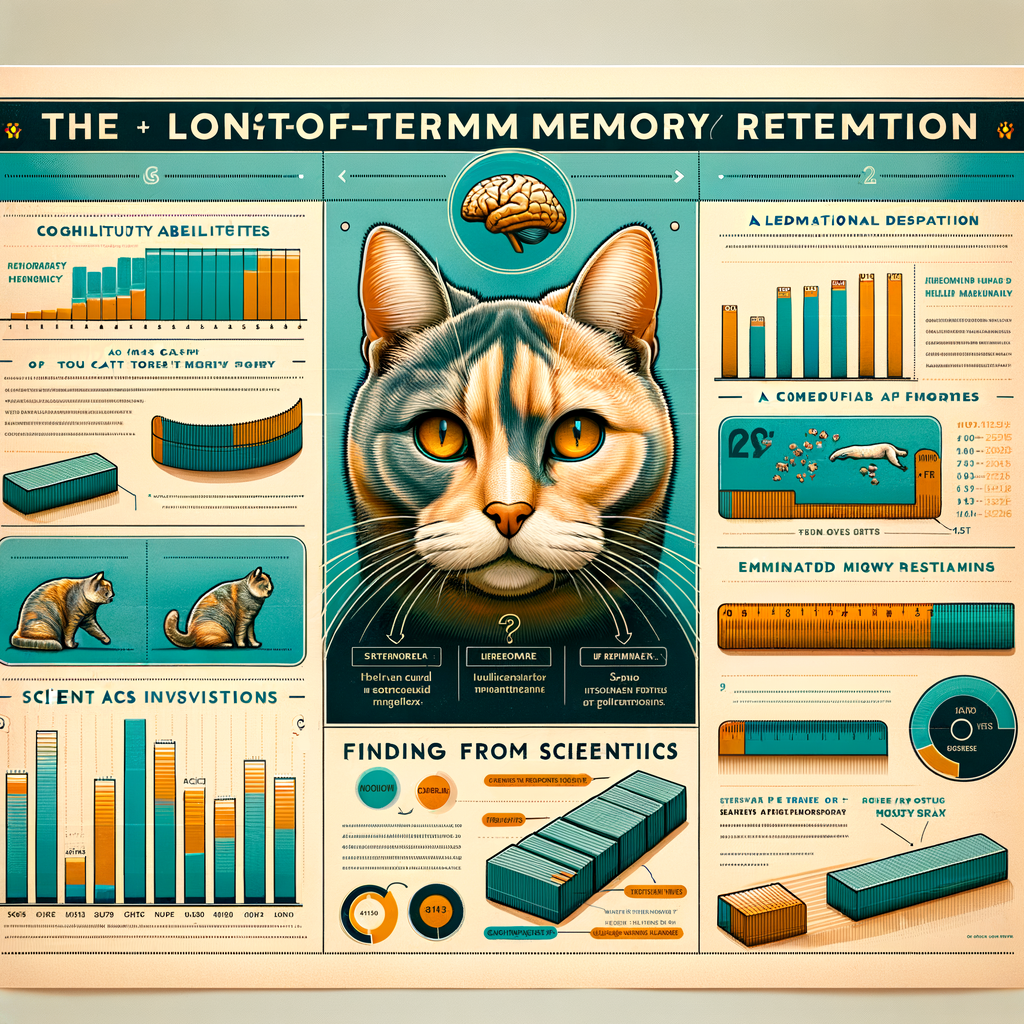
Introduction to Cat Memory Capabilities
Have you ever wondered how your feline friend remembers where you’ve hidden their favorite toy or how they know when it’s time for dinner? This is all thanks to their incredible memory capabilities. In this section, we will delve into the fascinating world of cat memory, shedding light on its basic understanding and debunking common misconceptions.
-
Understanding the Basics of Cat Memory
Cats, like humans, have both short-term and long-term memory. Short-term memory, also known as working memory, allows cats to remember information for a brief period. This is what helps them remember where they left their toy a few minutes ago.
On the other hand, long-term memory is what enables cats to remember experiences over a longer duration. For instance, if a cat has had a negative experience with a particular object or person, they are likely to remember it and react accordingly in the future.
It’s important to note that a cat’s memory is highly influenced by their emotional experiences. This means that they are more likely to remember events that have a strong emotional impact on them, whether positive or negative.
-
Common Misconceptions about Cat Memory
One common misconception about cat memory is that cats have a short memory span. However, research has shown that cats can remember information for up to 10 years, especially if it’s related to survival or is emotionally significant.
Another misconception is that cats cannot remember their owners. Contrary to this belief, cats can indeed remember their owners and other familiar people. They can recognize their owner’s voice and scent, and they often show signs of recognition when they see a familiar face.
Lastly, some people believe that cats do not have a sense of time. While it’s true that cats do not perceive time in the same way humans do, they do have a sense of routine. They can remember feeding times and other regular events, indicating a form of time memory.
In the following sections, we will delve deeper into the intricacies of cat memory, exploring their cognitive abilities, insights from research, and practical applications of understanding cat memory. So, stay tuned to unravel the fascinating world of cat memory!
Understanding Cat Memory: Long-Term Memory in Cats
When it comes to understanding our feline friends, one of the most intriguing aspects is their memory. Just like humans, cats also possess long-term memory. But how far back can they remember? Let’s delve into this fascinating topic.
How Far Back Can Cats Remember?
It’s a common question among cat owners and enthusiasts: How far back can cats remember? While the exact duration of a cat’s memory recall might vary, there are some interesting insights we can draw from research and case studies.
- Exploring the duration of cat memory recall
- Case study: Memory retention in cats
Studies suggest that cats have a memory span of about 16 hours. This means that a cat is likely to remember something it experienced 16 hours ago. However, this doesn’t mean they forget everything after this period. Certain memories, especially those associated with strong emotions or survival instincts, can stay with a cat for a lifetime. For instance, if a cat had a traumatic experience with water as a kitten, it might retain a fear of water throughout its life.
One notable case study involved a cat named Holly. Holly was separated from her owners while on vacation, nearly 200 miles away from home. Despite the distance and time, Holly managed to find her way back home after two months. This remarkable story suggests that cats can remember their homes and owners for a significant period, even under challenging circumstances.
In conclusion, while the duration of a cat’s memory recall might vary, it’s clear that cats are capable of retaining important memories for a significant period. Whether it’s remembering their home, their owners, or experiences from their past, cats’ long-term memory is truly a fascinating aspect of their cognitive abilities.
Factors Influencing Cat Memory Span
When it comes to understanding cat memory, it’s important to consider the factors that can influence their memory span. Two key factors that play a significant role in shaping a cat’s memory are age and health. Let’s delve deeper into these aspects:
- Age and memory in cats
Just like humans, cats’ cognitive abilities can change as they age. Research indicates that older cats may experience a decline in memory and other cognitive functions. This is similar to the aging process in humans, where memory can start to fade with advancing age.
However, it’s also important to note that not all cats will experience this decline. Just as some people maintain sharp memories into their old age, some cats also retain their cognitive abilities well into their senior years. It’s a complex process that can vary greatly from one cat to another.
- Health and its impact on cat memory
Health is another crucial factor that can impact a cat’s memory. Cats with certain health issues, particularly those affecting the brain, may experience memory problems. For instance, conditions like feline cognitive dysfunction, similar to Alzheimer’s in humans, can significantly affect a cat’s memory.
On the other hand, a healthy cat with a balanced diet and regular exercise is more likely to maintain a good memory. Regular vet check-ups can also help to detect any potential health issues early and keep your cat’s memory sharp.
In conclusion, understanding the factors that influence cat memory can help us provide better care for our feline friends. By considering their age and health, we can take steps to support their cognitive abilities and enhance their quality of life.
Cat Cognitive Abilities: More Than Just Memory
While it’s true that cats have impressive memory capabilities, their cognitive abilities extend far beyond just remembering. Cats are intelligent creatures with a wide range of cognitive skills that help them navigate their world. Let’s delve deeper into understanding these abilities.
Understanding the Full Spectrum of Cat Cognitive Abilities
Cognitive abilities refer to the mental capabilities that a cat uses to process information, solve problems, and make decisions. These abilities are not just about memory, but also involve problem-solving skills and spatial recognition. Let’s explore these in detail.
- Problem-solving skills in cats
- Spatial recognition and memory in cats
Cats are known for their problem-solving skills. They can figure out how to open doors, find hidden food, and navigate complex paths to reach their desired destination. A study conducted by the University of Oxford found that cats could solve puzzles faster than dogs when they were motivated by food rewards. This demonstrates their ability to use logic and reasoning to solve problems.
Spatial recognition is another important cognitive ability in cats. They have a keen sense of their surroundings and can remember the layout of their environment. This is why cats can navigate their way back home even after wandering far away. A study published in the Journal of Comparative Psychology found that cats could remember the location of hidden objects for up to 16 hours, indicating a strong spatial memory.
In conclusion, cats are not just memory masters; they are also skilled problem solvers and have a strong sense of spatial recognition. These cognitive abilities make them fascinating creatures and understanding them can help us provide better care for our feline friends.
Insights from Cat Memory Research
In recent years, scientists have made significant strides in understanding the memory capabilities of cats. These findings have not only shed light on the cognitive abilities of our feline friends but also provided valuable insights into their behavior.
Recent Findings in Cat Memory Studies
Research into cat memory has revealed some fascinating facts. Let’s delve into the key takeaways from these studies and their implications for understanding cat behavior.
- Key takeaways from recent research
- Implications for understanding cat behavior
Recent studies have shown that cats have both short-term and long-term memory capabilities. They can remember information for up to 10 years, especially if it is related to survival, such as the location of food or a dangerous area. Cats also have a strong spatial memory and can remember the layout of their environment for a long time.
These findings have significant implications for understanding cat behavior. For instance, if a cat behaves unusually, it might be because it remembers a traumatic event from the past. Similarly, if a cat seems to understand a command or a trick after a long time, it might be because it has remembered it from previous experiences. Understanding these memory capabilities can help cat owners provide better care for their pets.
These insights from cat memory research have opened up new avenues for understanding and interacting with our feline companions. They have shown that cats are not just instinct-driven creatures, but have complex cognitive abilities that allow them to remember and learn from their experiences.
| Key Findings | Implications |
|---|---|
| Cats have both short-term and long-term memory capabilities. | This can explain why cats remember certain locations or events for a long time. |
| Cats have a strong spatial memory. | This can explain why cats can navigate their environment so well. |
| Cats can remember information related to survival. | This can explain why cats can quickly learn to avoid dangerous areas or remember where food is located. |
Practical Applications: Using Your Understanding of Cat Memory
Understanding your cat’s memory can have many practical applications. One of the most significant is training your cat. By leveraging their memory recall, you can teach them new behaviors and commands.
Training Your Cat: Leveraging Their Memory Recall
Training a cat is not always an easy task, but with a good understanding of their memory capabilities, it can become much simpler. Here are some effective training techniques based on cat memory research and a case study of successful cat training using these techniques.
- Effective training techniques based on cat memory research
- Case study: Successful cat training using memory techniques
Cats have a short-term memory of about 16 hours. This means that if you want to teach your cat a new trick, you should practice it several times within this time frame. Cats also respond well to positive reinforcement. Rewarding your cat with a treat or praise immediately after they perform the desired behavior can help them remember it. Consistency is also key. Try to use the same command and reward each time.
Consider the case of Whiskers, a domestic short-haired cat. Whiskers’ owner used the techniques mentioned above to teach him to sit on command. The owner would say “sit”, gently push Whiskers’ bottom down, and then immediately give him a treat. After repeating this several times over a few hours, Whiskers began to sit on command even without the treat. This case study shows that understanding and leveraging a cat’s memory can lead to successful training.
In conclusion, understanding your cat’s memory can be very beneficial. It can help you train your cat more effectively, leading to a happier and more harmonious relationship between you and your feline friend.
Improving Your Cat’s Memory: Tips and Tricks
Improving your cat’s memory is not as complicated as it may seem. With a few simple activities and dietary changes, you can boost your feline friend’s cognitive abilities. Here are some practical tips and tricks to help you out.
- Activities to Enhance Your Cat’s Memory
- Interactive Toys: Toys that require your cat to solve a puzzle or perform a specific action to get a reward can help improve their problem-solving skills and memory.
- Hide and Seek: Hide treats or toys around your house and encourage your cat to find them. This game not only provides physical exercise but also stimulates their memory and hunting instincts.
- Training Sessions: Training sessions that involve commands or tricks can help improve your cat’s memory. Remember to keep the sessions short and fun to maintain your cat’s interest.
- Dietary Tips for Boosting Cat Memory
- Omega-3 Fatty Acids: Foods rich in Omega-3 fatty acids, like fish, can support brain health and improve memory.
- Antioxidants: Antioxidants can help protect your cat’s brain from damage. Look for cat food that contains antioxidants like vitamins C and E.
- Water: Dehydration can affect your cat’s cognitive functions, including memory. Ensure your cat has access to fresh water at all times.
Engaging your cat in stimulating activities is a great way to enhance their memory. Here are a few suggestions:
What your cat eats can significantly impact their memory and overall cognitive health. Here are some dietary tips:
Remember, every cat is unique, and what works for one might not work for another. It’s always a good idea to consult with your vet before making significant changes to your cat’s routine or diet.
Conclusion: The Fascinating World of Cat Memory
In this article, we’ve explored the intriguing realm of cat memory. We’ve delved into their cognitive abilities, long-term memory, and the latest research findings. Let’s take a moment to recap and reflect on what we’ve learned.
- Recap of cat memory capabilities and research:
- Final thoughts on the importance of understanding cat memory:
Cats have a remarkable memory that is much more complex than we initially thought. They possess both short-term and long-term memory capabilities, similar to humans. Through various studies, we’ve discovered that cats can remember important people, places, and experiences for years. They can also learn and remember how to perform tasks, demonstrating their problem-solving abilities.
Research has also shown that cats have a sense of time, remembering when specific events occur, such as feeding times. They also exhibit spatial memory, remembering the layout of their environment. This is crucial for their survival, allowing them to navigate their surroundings effectively.
Understanding cat memory is not just fascinating; it’s also essential for cat owners and animal behaviorists. It helps us better understand our feline friends, improving our ability to care for them and meet their needs. Recognizing their memory capabilities can enhance our interactions with them, making our relationships more rewarding.
Furthermore, this knowledge can help us develop better training methods, utilizing their memory to teach them new skills or behaviors. It can also assist in identifying any changes in their memory function, which could indicate health issues.
As we continue to learn more about cat memory, we can look forward to gaining deeper insights into their world. It’s a fascinating journey of discovery that brings us closer to understanding these wonderful creatures.
